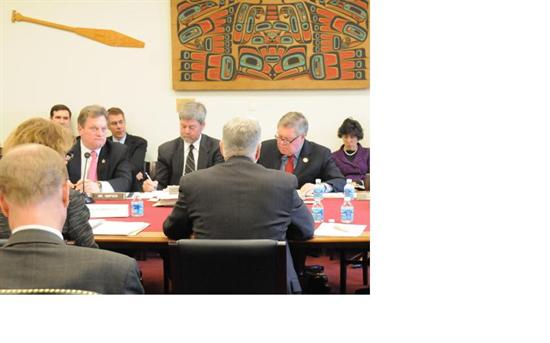 |
|
| Email Newsletter | |
|
Recently in Washington “I strongly believe the Democrats’ healthcare bill is the wrong direction our nation and may well be unconstitutional,” said Simpson. “I believe the best thing we could do is repeal the bill in its entirety and start over by passing smaller bills that enjoy bipartisan support and focus on bringing down costs for American healthcare consumers.” Simpson also stressed that while working toward a full-scale repeal, Republicans in Congress and in the states should work to change the law in any way possible. “The simple truth is that the prospects for full-scale repeal are slim as long as President Obama is in office and can veto any legislation we might be able to pass through Congress,” said Simpson. “So while we wait for the Presidential election of 2012, we should move forward with other measures that hold more near-term promise of blunting the impact of the Democrats bill. Those efforts include supporting Idaho’s Constitutional challenge to the Democrats bill, amending the bill to alter its most onerous provisions, and seeking limitations on funding of its implementation. Limiting the reach and impact of this bill must be a multi-pronged approach.” Simpson and 70 of his colleagues have cosponsored H.R. 1086, the HEALTH Act. This bill would implement effective medical malpractice reform and put an end to junk lawsuits by placing caps on non-economic damages and limiting attorney fees. This bill would save as much as $120 billion in wasteful spending by stemming the practice of defensive medicine. In addition, Simpson supports reforms to prohibit insurers from denying coverage to people because of pre-existing condition as well as reforms to make the purchase of health insurance for individuals tax-exempt like it is for employer-sponsored insurance. He also supports association health plans to create larger purchasing pools and prescription drug re-importation, which would control prescription drug costs by allowing Americans to buy FDA-approved prescription drugs from places such as Canada and Europe where drugs are sold for much less money. Simpson is also one of 67 Members of Congress to sign a pledge to support repeal of the Democrats healthcare reform legislation and passage of legislation that brings down the cost of healthcare without growing the involvement of government. During the hearing, Salazar committed to Simpson, who is Ranking Republican Member of the Subcommittee, that the Department would not use the Antiquities Act to designate national monuments without consulting with Congress and local officials. The Antiquities Act was passed in 1906 to give the President the authority to preserve prehistoric Native American cultural and archeological sites, but over the years has been used to set aside large areas for geological and cultural preservation. “I recognize the importance of preserving cultural, archeological, and geographic sites, but I am concerned that the Antiquities Act allows national monuments to be designated by executive order without any input from residents and local leaders,” wrote Simpson. “If we decide that an area should be designated as a national monument, it should be done through the legislative process, the way they were originally intended, so that the Antiquities Act is used as a tool for collaboration instead of a hammer.” Simpson has repeatedly raised the issue of public access to federal lands during subcommittee hearings, whether it is reiterating his support for snowmobiling and other recreation opportunities in our national parks, expressing concern about reduced funding for roads on Forest Service lands, or securing a commitment from the Administration to look at ways to improve the permit process for outfitters and guides. Committee Update At 9:30 a.m. on Wednesday, the House Interior and the Environment Appropriations Subcommittee will hold a hearing entitled, “Maintaining National Cultural and Scientific Centers: FY 2011 Budget Request for the Smithsonian, National Gallery of Art, Kennedy Center, Presidio, Woodrow Wilson Center.” Witnesses include: Dr. G. Wayne Clough, Secretary, Smithsonian Institution; Lee Hamilton, Director, Woodrow Wilson International Center for Scholars; Earl Powell, III, Director of the National Gallery of Art; Michael Kaiser, President of the John F. Kennedy Center for the Performing Arts; Craig Middleton, Executive Director, The Presidio Trust. At 2:00 p.m. on Wednesday, the House Energy and Water Appropriations Subcommittee will hold a hearing on the FY2011 budget request for the Bureau of Reclamation. Witnesses included BOR Commissioner Michael Conner and Assistant Secretary for Water and science Anne Castle. At 2:00 p.m. on Thursday, the House Interior and the Environment Appropriations Subcommittee will continue a series of hearings entitled “Voices from Our Native American Communities,” at which representatives from tribes and Native American advocacy groups will testify. House Legislative Business This Week TUESDAY, APRIL 13, 2010 Suspensions (6 Bills):
On Friday, the House will meet at 9:00 a.m. for legislative business. Suspensions (14 Bills):
H.R. 4715 - Clean Estuaries Act of 2010 (Subject to a Rule) (Sponsored by Rep. Bishop (NY) / Transportation and Infrastructure Committee)
The arts are a crucial part of recouping the nation's economy, and cities such as Boise will play a key role in that, National Endowment for the Arts Chairman Rocco Landesman said Monday. "The arts are an important part of economic recovery and urban renewal and development," Landesman told a gathering of Boise civic and arts leaders at the Esther Simplot Performing Arts Academy. "We're going to be making that point over and over again." Since taking the reins of the NEA seven months ago, Landesman has been on his "Art Works" tour to investigate the state of the nation's arts. The term "Art Works" has three meanings, he said. It refers to actual works of art. It refers to how the arts can transform people's lives, and to how the arts can generate economy. "Boise is almost a poster child for what we've been talking about at the NEA," he said. After a Basque breakfast with Mayor Dave Bieter, Landesman toured the Simplot academy, the Idaho Shakespeare Festival Amphitheater, then traveled with Congressman Mike Simpson to Jerome to watch a 50-minute, Cliff's Notes-style version of the classic tragedy "Othello" from ISF's Shakespearience educational tour. "It was a long trip but totally worth it," Landesman said. "I'd never seen anything like that." He outlined his goals and strategies for growing the NEA's funding by developing creative partnerships with other federal departments such as transportation and housing and urban development. It was the quiet voice of Simplot that elicited the strongest reaction from Landesman. She said that arts should be touted like football and expressed concerns about the movement toward letting the market dictate which arts receive financial support. "We need to have direct support for the art institutions and their work," Landesman said, signaling a change from the way the NEA currently funds the arts. "That to me is job one." That isn't what Landesman initially said when he took office. "That's been an evolution in my thinking," Landesman said. "My first impulse was, my God, we've got to get some of that 40 percent back. But when I started learning more about it on trips like this, I started to see the real value of states' arts agencies." "I've been around long enough to know several NEA chairs, and I get excited about them for different reasons," she said. "But I know these things take time to change, so I'm not expecting miracles." |
|
| BIOGRAPHY | NEWS CENTER | ISSUES | SERVICES FOR YOU | 2ND DISTRICT | CONTACT | |

